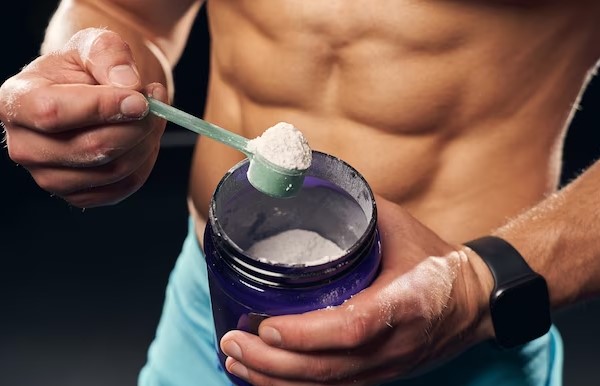As little as a decade ago, supplements for health and fitness were a fringe phenomenon, confined to the shelves of niche health stores or hardcore fitness enthusiast clubs. However, those days are long gone. Supplements have exploded in popularity, with a staggering 58% of all Americans taking at least one supplement daily.
The benefits of supplements are increasingly well-known, and a range of medical professionals and wellness gurus recommend taking supplements as the bare minimum that you can do for your health.
But, when it comes to building muscle, what are the best supplements for the job? On this, the answers are not so clear. Conflicting information abounds.
The market is flooded with sub-standard or even dangerous products. So, how can you find the best supplement to help you reach your gain goals? Read our essential, in-depth guide to find out everything you need to know.
Know Your Goals
When it comes to muscle supplements, it is essential that you know where you are starting from and where you wish to go. First off, ask yourself the following questions:
- Why do I want to gain muscle mass?
- Is it necessary for me to build muscle?
- How much muscle do I wish to build?
- Am I more invested in strength or aesthetics?
- How far away do I feel from my goals?
From here, you can start to map out your goals in more detail and allow you to narrow down your search for supplements. After all, those who want bigger muscles will be better off searching for specific supplements that might differ from those best suited to people who want a quicker recovery time.
To illustrate this, here are three major supplement types, each of which is best suited to a particular goal:
Building Strength: Creatine Monohydrate
Creatine is a popular supplement known for its ability to enhance strength and power. It works by increasing the production of adenosine triphosphate (ATP), which provides energy for muscle contractions.
Creatine can help improve strength performance during high-intensity exercises, leading to increased muscle strength over time.
Boosting Muscle Size: Whey Protein
Whey protein is a fast-digesting protein source derived from milk. It is rich in essential amino acids, including leucine, which plays a crucial role in stimulating muscle protein synthesis.

Consuming whey protein after workouts can help promote muscle protein synthesis, supporting muscle growth and recovery. While it contributes to muscle size to some extent, its primary benefit lies in providing the necessary protein for muscle repair and growth.
Aiding Muscle Recovery: Branched-Chain Amino Acids (BCAAs)
BCAAs, including leucine, isoleucine, and valine, are essential amino acids that the body cannot produce on its own.
They are known for their ability to promote muscle protein synthesis and reduce muscle protein breakdown. BCAAs can be beneficial for speeding up workout recovery time by reducing muscle soreness and aiding in muscle repair.
These are some of the basic, well-known starting points for supplements for those that are interested in muscle gains and recovery.
Speak to a Healthcare Professional
No matter what type of supplement you gravitate towards, always consult a healthcare professional whenever possible.
Even the commonplace supplements you can find at any supermarket can have side effects for some people. A professional can help you navigate these or tell you whether you should avoid a specific type of supplement based on your own medical history.
On top of this, a qualified professional can help you to make a more informed and results-driven choice. Wanting to know how to get stronger is not, after all, purely a matter of looks or vanity.
We know that weight training and sufficient muscle mass are essential for living a long, healthy, and high-quality life. Building your muscles now could improve your health for the rest of your life, and any medical professional will be happy to confirm this.
By speaking to them, they might be able to point you in the right direction to help you find the supplements that will help you meet your health goals.
Quality Over Quantity, Every Time
There is, to put it simply, no shortage of supplement choices out there. Even a quick Google search will reveal thousands upon thousands of different options, each one claiming to be the best one for your specific fitness routine.
Of course, no supplement is a silver bullet, and you should be wary of any company that claims the opposite for its product.
The most important thing for you is to understand how to identify quality, rather than simply finding a supplement that offers as much powder as possible for as little money as possible.
There are several key ways to ascertain whether a supplement meets the bar for quality, such as:
Third-Party Testing
A good rule of thumb is to choose a company that can prove its products are all tested by an independent third party.
For example, those looking for SARMs for sale should always look for a vendor that can provide a Certificate of Analysis (COA) that proves that this exact form of testing has taken place.
User Reviews
When in doubt, see what the fitness community is saying. If you’re new to supplements, always read reviews of any product.
If there are lots of reviews for a product, you can usually be confident that more experienced people than yourself have taken the time to try it and can give you a sense of whether it is right for you.
Whole Foods are Everything
Supplements are never a substitute for a balanced diet. Rather, they should complement your diet to ensure that you are getting the most out of your nutrition.
While supplements can be beneficial, they should not replace the nutritional value and benefits provided by whole foods. Focus on consuming nutrient-dense sources of protein, carbohydrates, and fats.
Make sure you are getting your minimum required daily dose of fiber, antioxidants, and micronutrients. By ensuring that you have a well-balanced diet to begin with you can build the best possible base from which to launch your supplement journey.
Map Your Nutrition
So, what if you don’t know what a well-balanced diet should look like for yourself?
How do you know which supplements will actually benefit you in your quest to build muscle strength, if you don’t know what you’re missing? For this, we recommend mapping out your nutrition fully.
Make sure to find out the recommended intakes of different nutrients for your body type and body goals. If you’re feeling especially ambitious, you can even arrange a blood and urine test to find out exactly where your deficiencies lie, and what you need more of.
From here, you can refine your supplement search so that you are getting exactly what you need to reach your goals. Nothing more, nothing less.
Know the Best Supplements for Protein and Carbs
At the end of the day, the most important things for building muscle are protein and carbohydrates. Without sufficient amounts of these, your muscles will simply not have the fuel they need to grow.
No ifs, no buts. Any effective supplement journey requires a thorough understanding of the most efficient places to get your protein and carbs. Let’s break it down:
Carbohydrates
You might already know your main high-carb foods, such as corn, potatoes, and rice. All three of these are rich sources of maltodextrin, a complex carbohydrate that provides a sustained, consistent release of energy.
Meanwhile, dextrose is often derived from corn but is widely used in post-workout supplements due to its ability to replenish glycogen and promote muscle recovery.
Finally, Highly Branched Cyclic Dextrin (HBCD) is a specialized carbohydrate supplement that offers rapid gastric emptying and efficient absorption. This one provides a sustained source of energy without causing gastrointestinal irritation, making it popular among endurance athletes.
Proteins
We’ve already covered the importance of whey protein, which is essential for muscle recovery and muscle protein synthesis. On top of this, there are casein proteins, which are also derived from milk.
This one breaks down more slowly than whey and provides a sustained release of amino acids over time.
For a complete amino acid profile, always remember to get your plant proteins. For this, you can use plant-based supplements based on the likes of peas, hemp, rice, and soy.
Assess Your Exact Recovery Needs
How well you recover from your workouts will absolutely determine your supplement needs.
If you’re the kind of person that is sore for a long time after a workout, or your recovery time between sets is very long, then this will affect your needs. Optimizing your recovery time will not only help you to build muscle more quickly but will also allow you to enjoy more holistic benefits from your weight training.
Remember to look out for classic supplement ingredients such as glutamine and plenty of Omega-3 fatty acids, as these are well-known to boost recovery.
Timing and Dosage are Keys
This one applies no matter which supplements you eventually land on. It is a common mistake to assume that greater quantities of supplements consumed = more gains. However, this could not be further from the truth.
You should always stick to the recommended dose amount and timing from the manufacturer.
Too much can cause potentially harmful side effects and negate any potential benefits. Too little will simply not be enough to do the job. Stick to the rules if you genuinely want to see results.
Consider Your Budget
There is a very, very broad range of prices across the supplement market right now. Some supplement routines might cost you $10 a month, others might cost you $1000 a month.
Remember, more expensive does not mean better. What matters is quality and the mix of ingredients. There is no need to pay for supplements with fancy branding if you can get the exact same ingredients for a fraction of the price.
In a world of fitness influencers and endless scams in the fitness community, take care not to throw your money away on something totally unnecessary.
Look Out for the Right Credentials
You should never take the manufacturer’s word for the quality, effectiveness, and safety of their products. Instead, keep an eye out for any official, independent certifications attached to a product that will verify its quality.
The previously-mentioned Certificate of Analysis (COA) is a good place to start. You can also look for certifications from industry watchdogs such as Informed-Sport, NSF International, or United States Pharmacopeia (USP). These are badges of quality that you can trust.
Know What to Avoid
Knowing what you need is one thing. Knowing what to avoid is another. Too many supplements out there contain excessive amounts of bad ingredients that can cause unwelcome side effects and degrade your health over time.
Avoid supplements with too many stimulants such as caffeine or ephedrine, as these can cause cardiovascular problems. Of course, steroids and prohormones should always, always, always be avoided unless specifically proscribed to you by a doctor.
Look out for and avoid supplements that might contain heavy metals such as mercury, cadmium, or arsenic, which is more common than you might think.
Be Vigilant for Side Effects
No matter what supplements you end up choosing for your muscle gains, always keep a watchful eye out for side effects.
Even if the ingredients are quite benign, you might have an allergy you were unaware of, or you could fall victim to misleading labeling. Always pay attention to your body and be mindful of any changes that you cannot explain.
This could mean stomach problems, high blood pressure, drowsiness, anxiety, excessive weight gain, or more. By being vigilant, you can quickly take action if a supplement is not working for you.
Your Health, in Your Hands
For those looking to get bigger muscles, supplements are almost a necessity these days. The best supplements, however, are not just those that deliver those gains.
They are the ones that do so in a way that benefits your overall health and helps you to address any gaps in your nutrition. By following this guide, you can find a long-term supplement solution that is just right for you.
For more expert guidance on how to hack your health and bring it into your hands, we have got you covered. Make sure to consult our dedicated health articles to find out how to take back control of your health.




